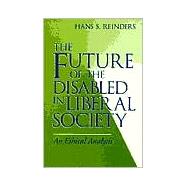Reinders also argues that this conflict cannot be resolved or controlled on the level of public morality. Because a liberal society makes a commitment to individual freedom and choice, its members can consider the diagnostic

Note: Supplemental materials are not guaranteed with Rental or Used book purchases.
Purchase Benefits
What is included with this book?
Reinders also argues that this conflict cannot be resolved or controlled on the level of public morality. Because a liberal society makes a commitment to individual freedom and choice, its members can consider the diagnostic
| Preface | ix | ||||
|
1 | (20) | |||
|
1 | (3) | |||
|
4 | (5) | |||
|
9 | (3) | |||
|
12 | (9) | |||
| PART ONE | |||||
|
21 | (16) | |||
|
21 | (1) | |||
|
22 | (2) | |||
|
24 | (2) | |||
|
26 | (4) | |||
|
30 | (5) | |||
|
35 | (2) | |||
|
37 | (14) | |||
|
37 | (2) | |||
|
39 | (1) | |||
|
40 | (2) | |||
|
42 | (2) | |||
|
44 | (2) | |||
|
46 | (3) | |||
|
49 | (2) | |||
|
51 | (15) | |||
|
51 | (2) | |||
|
53 | (3) | |||
|
56 | (1) | |||
|
57 | (2) | |||
|
59 | (2) | |||
|
61 | (2) | |||
|
63 | (3) | |||
|
66 | (18) | |||
|
67 | (1) | |||
|
68 | (2) | |||
|
70 | (3) | |||
|
73 | (2) | |||
|
75 | (3) | |||
|
78 | (3) | |||
|
81 | (3) | |||
|
84 | (21) | |||
|
84 | (2) | |||
|
86 | (5) | |||
|
91 | (3) | |||
|
94 | (2) | |||
|
96 | (3) | |||
|
99 | (2) | |||
|
101 | (4) | |||
| PART TWO | |||||
|
105 | (17) | |||
|
105 | (3) | |||
|
108 | (1) | |||
|
109 | (4) | |||
|
113 | (3) | |||
|
116 | (2) | |||
|
118 | (4) | |||
|
122 | (17) | |||
|
122 | (3) | |||
|
125 | (2) | |||
|
127 | (3) | |||
|
130 | (2) | |||
|
132 | (3) | |||
|
135 | (4) | |||
|
139 | (20) | |||
|
139 | (3) | |||
|
142 | (1) | |||
|
143 | (3) | |||
|
146 | (2) | |||
|
148 | (5) | |||
|
153 | (6) | |||
| PART THREE | |||||
|
159 | (16) | |||
|
159 | (3) | |||
|
162 | (2) | |||
|
164 | (2) | |||
|
166 | (5) | |||
|
171 | (4) | |||
|
175 | (18) | |||
|
176 | (1) | |||
|
177 | (3) | |||
|
180 | (3) | |||
|
183 | (4) | |||
|
187 | (6) | |||
|
193 | (16) | |||
|
193 | (1) | |||
|
194 | (3) | |||
|
197 | (1) | |||
|
198 | (2) | |||
|
200 | (3) | |||
|
203 | (3) | |||
|
206 | (3) | |||
| Notes | 209 | (50) | |||
| Bibliography | 259 | (12) | |||
| Index | 271 |
The New copy of this book will include any supplemental materials advertised. Please check the title of the book to determine if it should include any access cards, study guides, lab manuals, CDs, etc.
The Used, Rental and eBook copies of this book are not guaranteed to include any supplemental materials. Typically, only the book itself is included. This is true even if the title states it includes any access cards, study guides, lab manuals, CDs, etc.